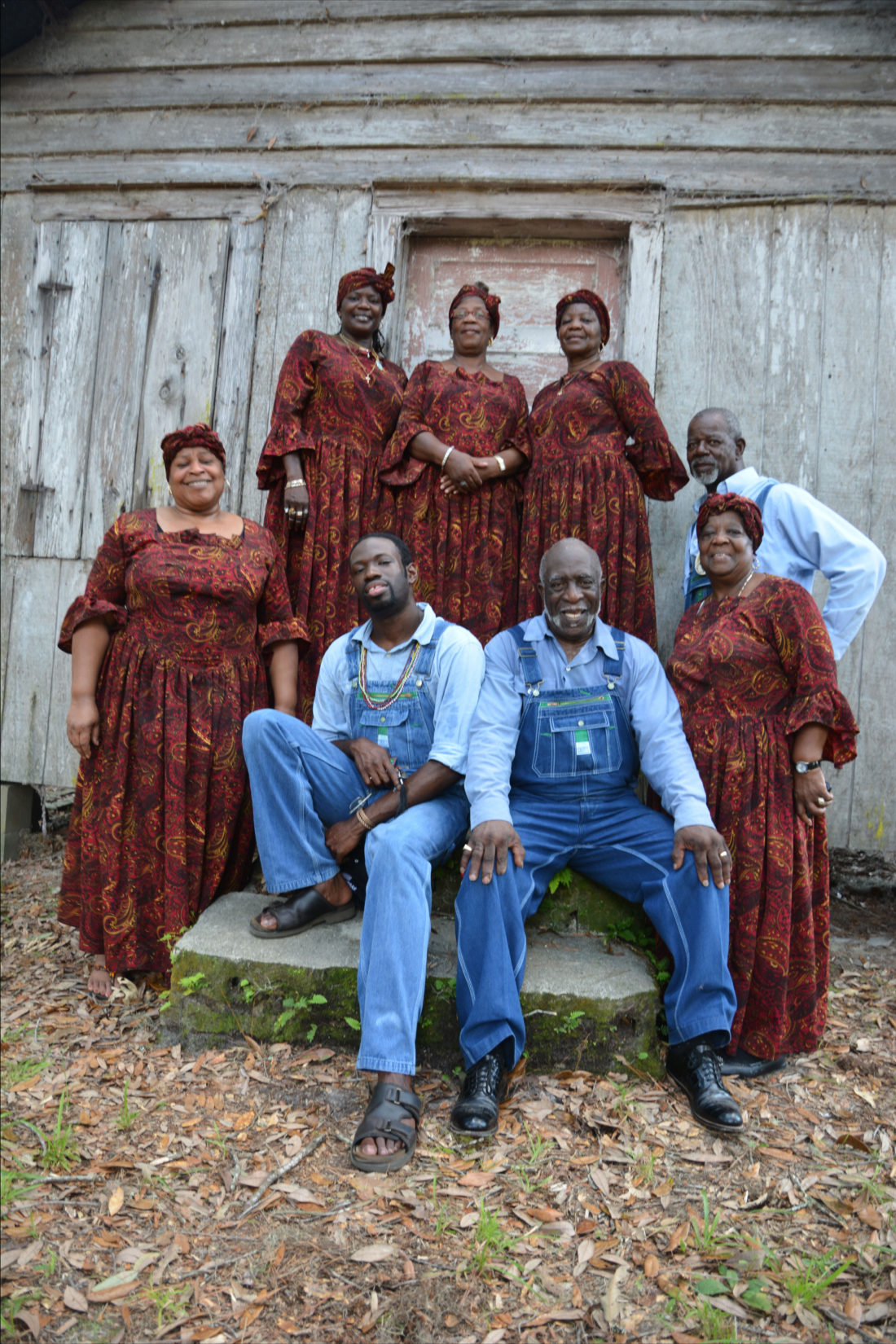Growing up, when Brenton Jordan and his cousins spent time with his great-grandmother, “She would actually grab the broom from out of the corner and she would teach us how to shout,” he recalls. “We would learn how to shout around the potbelly stove that sat in her den. I remember the stories she told me about her mother and the stories she told me about the songs.”
The ring shout is an ecstatic blend of call-and-response singing and polyrhythmic clapping propelled by the resounding thud of a stick being beaten on a wooden floor. It also happens to be the oldest surviving African-American musical tradition in North America.
The McIntosh County Shouters, who will perform at UNC Asheville on Thursday, Nov. 15, are the sole purveyors of this profound tradition. The group is from Bolden, Ga., aka “Briar Patch,” the only place on the continent that has retained the ring shout in its original form since the days of slavery. West African in origin, the shout continued along the coastal regions in Georgia and South Carolina longer than it did anywhere else. The isolation of the region, along with its difficult climate, are some of the reasons the tradition has persisted.
“I honestly just thought it was something the old people made up and did because it was fun to do,” says Jordan, the stick-man and sometimes song leader for the group. The youngest member of the Shouters, he began performing with the collective regularly in 2010.
But his introduction to the art form goes back much further — back to the days around his great-grandmother’s potbelly stove. As a child, Jordan was fascinated by the stories depicted by the ring shout. He learned to beat the stick at age 5 and led his first shout song at age 9. “I got the nod of approval from the elders to keep shouting,” he says.
Still, “I didn’t know the sacredness that it was to me as a black man, as a Gullah-Geechee person, and as a member of this family until much later.” he says. The Gullah-Geechee are descendants of enslaved West Africans who lived together on the isolated coastal regions and barrier islands of Georgia and South Carolina. The culture is still rich in tradition, crafts and folklore.
It was in those rare “sacred moments” that Jordan felt connected to something larger. A student of African dance and culture, he began to “connect the dots” — to realize the full weight of the shout’s history. “It’s at the forefront and it’s the core of all African-American and even American music,” he explains. “Drag it out a bit and make it more melodic, and a shout becomes a gospel song. Chop it up and double up on beats, and you have a hip-hop song.”
For generations, the shout has been performed annually in Bolden, at Mount Calvary Baptist Church, on New Year’s Eve for Watch Night. Since 1980, The McIntosh County Shouters have taken the shout on the road, performing at folk festivals, public schools and universities across the United States. The eight members (including Carla Sullivan, Freddie Palmer, L.C. Scott, Alberta Sallins, Carla Jordan, Carolyn Palmer and narrator Vanessa Carter) are all descendants of London and Amy Jenkins, who were born as slaves in McIntosh County.
Taking the music to audiences across the country, the group hopes to share some of that deep connection to their roots. “When we’re in schools in southeastern Georgia, for me, it’s about imparting to the young black students that this a tradition that your ancestors once did,” Jordan says. “That this is as much a part of me as it is a part of you.”
As for white audiences, he hopes they’ll leave the performance not only with a greater understanding and appreciation of black culture and tradition but also something more. “These songs express some of the very same hopes, dreams, wishes and wants that we deal with now,” he says. “The songs still ring just as true. The same issues that we faced during slavery have just taken a new face.”
In recent years, The McIntosh County Shouters have recorded albums for Smithsonian Folkways and performed at the Library of Congress and the John F. Kennedy Center. The group has even been named master artists by the National Endowment for the Arts. In 2016, the group performed in Washington D.C., as part of the Freedom Sounds Festival celebrating the opening of the National Museum of African American History and Culture.
While performing, the Shouters rely on good acoustics and a smooth floor. Done right, the way the dancers move their feet makes it seem as if they’re floating. So it’s no wonder then that when asked about what difficulties the group faces on the road, Jordan’s answer is simple: carpet. “The biggest challenges are modern accommodations,” he says with a laugh. “Carpet is the shout’s worst enemy.”
WHO: The McIntosh County Shouters
WHERE: Lipinsky Auditorium at UNC Asheville, 300 Library Lane, unca.edu
WHEN: Thursday, Nov. 15, 7 p.m. $15 general admission/free for UNCA students




Before you comment
The comments section is here to provide a platform for civil dialogue on the issues we face together as a local community. Xpress is committed to offering this platform for all voices, but when the tone of the discussion gets nasty or strays off topic, we believe many people choose not to participate. Xpress editors are determined to moderate comments to ensure a constructive interchange is maintained. All comments judged not to be in keeping with the spirit of civil discourse will be removed and repeat violators will be banned. See here for our terms of service. Thank you for being part of this effort to promote respectful discussion.